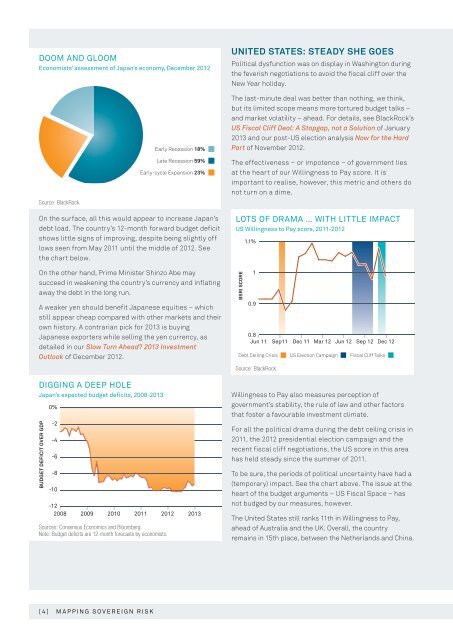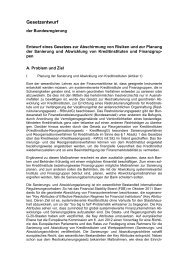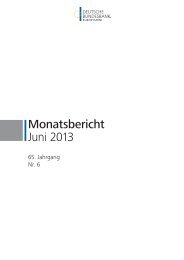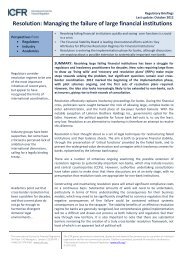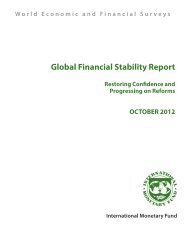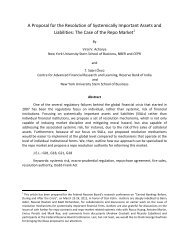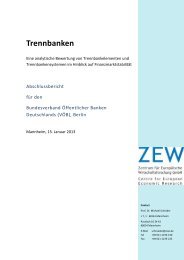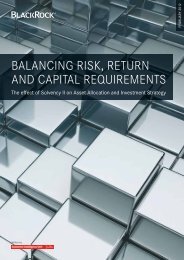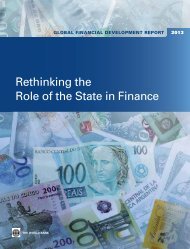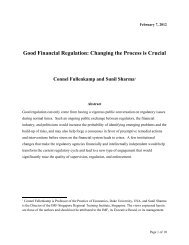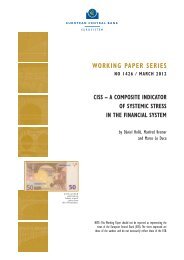blackrock investment institute - Financial Risk and Stability Network
blackrock investment institute - Financial Risk and Stability Network
blackrock investment institute - Financial Risk and Stability Network
Create successful ePaper yourself
Turn your PDF publications into a flip-book with our unique Google optimized e-Paper software.
DOOM AND GLOOM<br />
Economists’ assessment of Japan’s economy, December 2012<br />
Source: BlackRock.<br />
On the surface, all this would appear to increase Japan’s<br />
debt load. The country’s 12-month forward budget deficit<br />
shows little signs of improving, despite being slightly off<br />
lows seen from May 2011 until the middle of 2012. See<br />
the chart below.<br />
On the other h<strong>and</strong>, Prime Minister Shinzo Abe may<br />
succeed in weakening the country’s currency <strong>and</strong> inflating<br />
away the debt in the long run.<br />
A weaker yen should benefit Japanese equities – which<br />
still appear cheap compared with other markets <strong>and</strong> their<br />
own history. A contrarian pick for 2013 is buying<br />
Japanese exporters while selling the yen currency, as<br />
detailed in our Slow Turn Ahead? 2013 Investment<br />
Outlook of December 2012.<br />
DIGGING A DEEP HOLE<br />
Japan’s expected budget deficits, 2008-2013<br />
BUDGET DEFICIT OVER GDP<br />
0%<br />
-2<br />
-4<br />
-6<br />
-8<br />
-10<br />
-12<br />
2008 2009 2010 2011 2012 2013<br />
Sources: Consensus Economics <strong>and</strong> Bloomberg.<br />
Note: Budget deficits are 12-month forecasts by economists.<br />
[4] MAPPING SOVEREIGN RISK<br />
Early Recession 18%<br />
Late Recession 59%<br />
Early-cycle Expansion 23%<br />
UNITED STATES: STEADY SHE GOES<br />
Political dysfunction was on display in Washington during<br />
the feverish negotiations to avoid the fiscal cliff over the<br />
New Year holiday.<br />
The last-minute deal was better than nothing, we think,<br />
but its limited scope means more tortured budget talks –<br />
<strong>and</strong> market volatility – ahead. For details, see BlackRock’s<br />
US Fiscal Cliff Deal: A Stopgap, not a Solution of January<br />
2013 <strong>and</strong> our post-US election analysis Now for the Hard<br />
Part of November 2012.<br />
The effectiveness – or impotence – of government lies<br />
at the heart of our Willingness to Pay score. It is<br />
important to realise, however, this metric <strong>and</strong> others do<br />
not turn on a dime.<br />
LOTS OF DRAMA … WITH LITTLE IMPACT<br />
US Willingness to Pay score, 2011-2012<br />
BSRI SCORE<br />
1.1%<br />
1<br />
0.9<br />
0.8<br />
Jun 11 Sep11 Dec 11 Mar 12 Jun 12 Sep 12 Dec 12<br />
Debt Ceiling Crisis US Election Campaign Fiscal Cliff Talks<br />
Source: BlackRock.<br />
Willingness to Pay also measures perception of<br />
government’s stability, the rule of law <strong>and</strong> other factors<br />
that foster a favourable <strong>investment</strong> climate.<br />
For all the political drama during the debt ceiling crisis in<br />
2011, the 2012 presidential election campaign <strong>and</strong> the<br />
recent fiscal cliff negotiations, the US score in this area<br />
has held steady since the summer of 2011.<br />
To be sure, the periods of political uncertainty have had a<br />
(temporary) impact. See the chart above. The issue at the<br />
heart of the budget arguments – US Fiscal Space – has<br />
not budged by our measures, however.<br />
The United States still ranks 11th in Willingness to Pay,<br />
ahead of Australia <strong>and</strong> the UK. Overall, the country<br />
remains in 15th place, between the Netherl<strong>and</strong>s <strong>and</strong> China.


